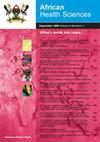安哥拉成人哮喘症状控制不佳的相关因素经常出现在门诊呼吸诊所
IF 0.9
4区 医学
Q3 MEDICINE, GENERAL & INTERNAL
引用次数: 0
摘要
背景:哮喘是最常见的慢性呼吸系统疾病之一,也是最常见的住院原因之一。 目的:探讨哮喘的临床特点及控制因素。 方法:2018年4月至2019年3月在罗安达军队医院进行横断面研究。数据收集采用关于哮喘症状和治疗、社会人口统计学和环境问题的问卷,以及评估哮喘控制水平的全球哮喘倡议(GINA)问卷。进行了有序逻辑回归分析。我们估计了较高类别哮喘控制的优势比。P<0.05被认为是显著的。 结果:样本包括305例≥18岁的哮喘患者,56%为女性,平均年龄41.3岁。约28%的患者哮喘得到控制,36%部分控制,35%未控制。哮喘控制不佳与频繁使用短效β -2激动剂[OR 5.70 (95%CI 2.37;13.7)]、口服皮质类固醇[OR 3.68 (95%CI 2.24;6.04)]和不正确的吸入器技术[OR 4.08 (95%CI 1.25;13.3)]有关。结论:罗安达有相当数量的成年人由于未充分使用吸入皮质类固醇治疗而患有未控制的哮喘。有必要制定战略管理和预防计划,以改善安哥拉哮喘患者的医疗保健。 关键词:哮喘;安哥拉;症状控制;吸入器。本文章由计算机程序翻译,如有差异,请以英文原文为准。
Factors associated with poor asthma symptom control in adult Angolan regularly seen at an outpatient respiratory clinic
Background: Asthma is one of the most common chronic respiratory diseases and one of the most frequent causes of hospitalcare.
Objectives: To describe the clinical characteristics of asthma and factors associated with its control.
Methods: A cross-sectional study was conducted at the Military Hospital in Luanda, from April 2018 to March 2019. Data collectionwas performed using questionnaires on asthma symptoms and treatment, socio-demographic and environmental questions,and a Global Initiative for Asthma (GINA) questionnaire to assess the level of asthma control. Ordinal logistic regressionanalyses were performed. We estimated odds ratios, for higher categories of asthma control. P<0.05 was considered significant.
Results: The sample consisted of 305 asthmatics ≥18-years-old, 56% women, with a mean age of 41.3 years. About 28% ofpatients had controlled asthma, 36% partially controlled and 35% uncontrolled. Poor asthma control was associated with frequentuse of short-acting beta-2 agonists [OR 5.70 (95%CI 2.37;13.7)], oral corticosteroids [OR 3.68 (95%CI 2.24;6.04)], andincorrect inhaler technique [OR 4.08 (95%CI 1.25;13.3)].
Conclusions: A significant number of adults living in Luanda have uncontrolled asthma due to the under-use of inhaled corticosteroidtherapy. It is necessary to develop strategic management and prevention plans to improve Angolan asthmatics' medicalcare.
Keywords: Asthma; Angola; symptom control; inhalers.
求助全文
通过发布文献求助,成功后即可免费获取论文全文。
去求助
来源期刊

African Health Sciences
MEDICINE, GENERAL & INTERNAL-
CiteScore
2.30
自引率
0.00%
发文量
179
审稿时长
>12 weeks
期刊介绍:
The African Health Sciences is an internationally refereed journal publishing original articles on research, clinical practice, public health, policy, planning, implementation and evaluation, in the health and related sciences relevant to Africa and the tropics. Its objectives are to: Advocate for and promote the growth of reading culture in sub Saharan Africa; Provide a high quality journal in which health and policy and other researchers and practitioners in the region can and world wide, can publish their work; Promote relevant health system research and publication in the region including alternative means of health care financing, the burden of and solution of health problems in marginalized urban and rural communities amongst the displaced and others affected by conflict; Promote research and the systematic collection and collation and publication of data on diseases and conditions of equity and influence; Promote development of evidence-based policies and guidelines for clinical, public health and other practitioners. African Health Sciences acknowledges support provided by the African Health Journals Partnership Project that is funded by the US National Institutes of Health (through the National Library of Medicine and the Fogarty International Center) and facilitated by the Council of Science Editors.
 求助内容:
求助内容: 应助结果提醒方式:
应助结果提醒方式:


